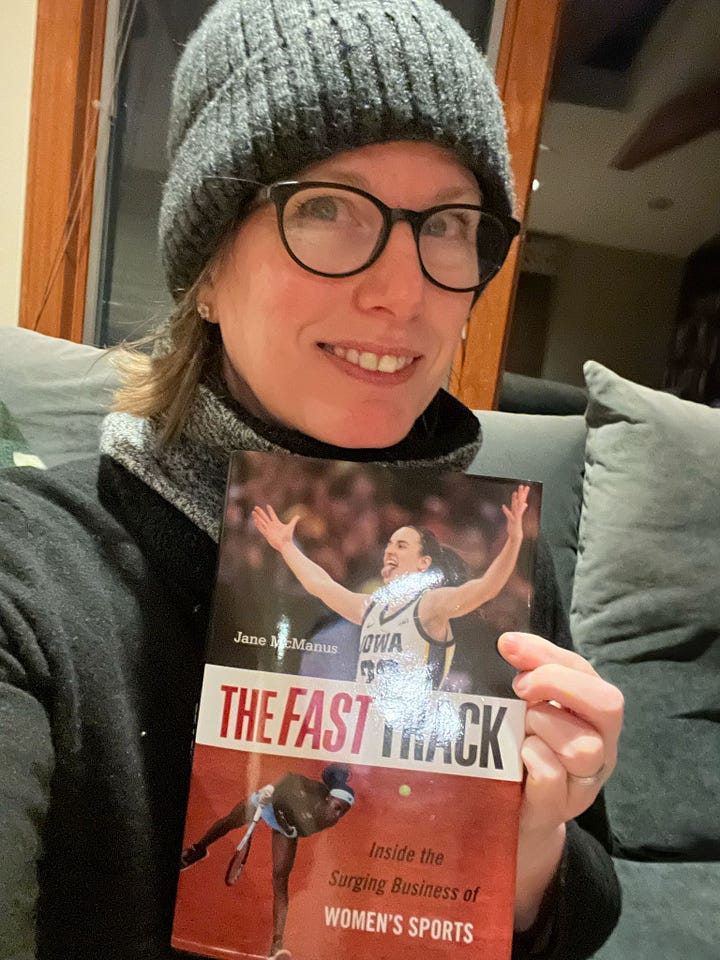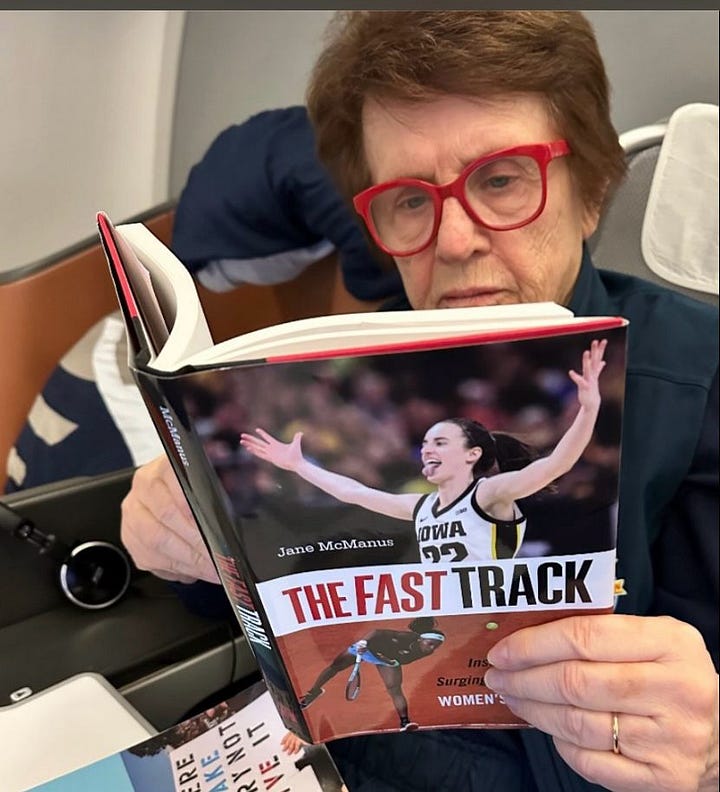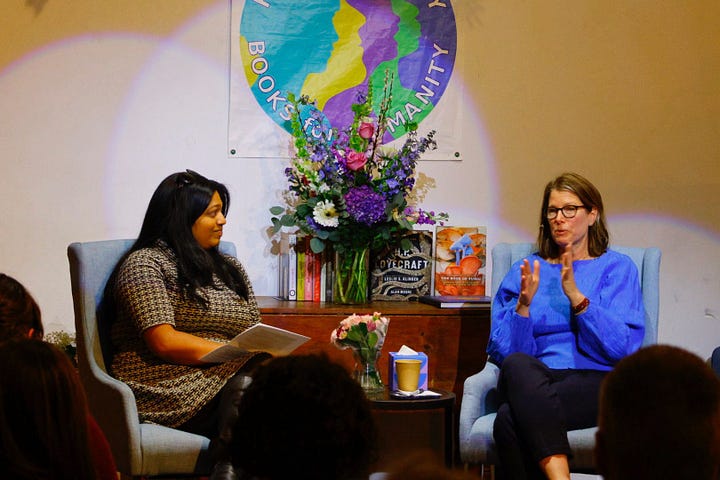Confidence, The One To Mess Them All Up
They all know they need to keep it around but, nonetheless, confidence always makes a point of ghosting them when they need it the most. The best love-hate relationship in pro tennis. Ask Iga Swiatek!
Welcome back! I’m in Angers as I’m writing this, in the West of France, where I was born, and it’s (finally) a stretch of beautiful sunny and warm days. Here’s me praying to the universe to spread it to Paris during Roland-Garros. I hope you’re all doing as well as possible and that you’ve found some sunshine.
What’s on the menu today? A musing about tennis and its best enemy-to-lover trope star: Confidence. Also, an interview with Jane McManus about her great book, The Fast Track, about the business of women’s sports. Also, Sharapova says, “Hold My Beer,” Federer and Sinner turn fashion gurus (or something) and the personal hell of Emil Ruusuvuori. Be ready to scroll, people! We’ll talk all things “last stretch of Rome” on Monday, which means, yes, this Jannik Sinner mindblowing return to the Tour, too.
This publication is supported by readers, so if you like what you’re reading, don’t hesitate to spread the word, try a paid subscription, like this post, or leave a comment, as it helps TSS discoverability. You can also prefer to buy me a cuppa!
Confidence, The One To Mess Them All Up
Groundbreaking, I know. It’s indeed nothing new in tennis, but when that curse lands on not only top players but proper Avengers, it always kind of blows my mind. These are the players who figured it all out. These are the players who won nearly everything there is to win. Who broke records. How come they aren’t immune to the depth of a confidence crisis? Right?
If Novak Djokovic was confident about what he was still doing out there, then his motivation to play and so his game wouldn’t be in this state. If Iga Swiatek was still confident that when she’s back on the wall, her best tennis comes to the rescue, she’d hit that forehand again like there’s no tomorrow and so wouldn’t be in this state either. But neither Novak nor Iga would put their hand in the fire for the sake of proving their confidence right now. It’s gone. For very different reasons, with very different symptoms, at very different stages of their career, but in the end, with the same result: the fire has been put out, and doubt has invaded the house. It’s the only image that comes to my mind when I look at them playing this year since Melbourne: the switch has been turned off.
It was puzzling to watch Djokovic so out of sorts in Madrid again, and it started to be sad to watch Swiatek drowning like that from Spain to Italy. It’s not a game issue. There’s zero reason for it to be a game issue, proof being than when their mind leaves them alone, the tennis flows (Novak was great in Melbourne and Miami until he wasn’t anymore, and Iga was really fraking good in a lot of events this year until she collapsed). So yes we’re back at this confidence elusive concept. It’s never clear how it goes away to reach this rock bottom but when it happens it has to be the only thing more destructive in tennis than a physical injury.
And yet, you have a clear process to repair a knee or a shoulder. You don’t have any sure path to repair confidence. Some players will build it on the practice court, others will only build it by winning. Novak Djokovic will only be healed by either Grand Slam title n°25 or the mourning of that chase and so retirement from the sport.
When I talked to Wim Fissette in Madrid, that’s actually what he told me about Swiatek: Iga now needs a title, that’s all. There will be nothing else to start rebuilding Swiatek than the only way she knows to prove her game’s worth: hands on a shiny trophy. Of course, it’s dangerous and not that healthy, but she has won so much in her young career that it’s the curse and gift she’ll have to deal with: her standards are through the roof.
There will be nothing else to start rebuilding Swiatek than the only way she knows to prove her game’s worth: hands on a shiny trophy.
Iga Swiatek is already hitting at Roland-Garros, and we’ll have to see if jumping right back into it was a good idea or the last drop to overflow her entire cup. That’s part of the mystery with her here: She swears she’s not having a burnout, yet she really doesn’t look like someone whose tennis mind is at peace enough right now to be even able to think. She and her team, of course, know better than us all what’s going on, and it seems, from what she said after Rome, that she admits she needs to switch mindset. She talked about how she was focusing too much on mistakes, and it reminded me something.
We now take for granted that Iga Swiatek is an ultra-aggressive player and a court dominator 100% of the time, not only when it’s time to go for the kill. We forgot that this was Swiatek 2.0. This was the version built with her previous coach when they rightfully decided she needed to accept missing in order to win bigger. And it worked. But it’s not her original mindset. She’s a perfectionist. She hates missing. And so right now, when you see all her shots landing everywhere but inside the court, you can imagine her suffering. What if it were her own game style that was now eating at her confidence? And it’s a vicious circle because she needs that style to win big, and so she needs to accept to miss, and so she needs to fix her relationship to this treacherous perfection concept, and so she needs to keep missing. Good luck needing to go for all your shots when your brain is screaming at you that you can’t be allowed to miss anymore. When each unforced error reinforces the feeling that your season is turning into a mess and that the throne is gone for good.
What if it were her own game style that was now eating at her confidence?
I’ve said it so many times, but it’s also been a lot of changes and a lot of noise around her since the end of last year. And Iga doesn’t do well with change. She got used to being World No.1. To be unbeatable. And you’re now telling her she’s getting toyed with by her former victims and may soon have to fight to remain a Top 10 player? She (unfortunately) keeps a close eye on her ranking points, and, well, right now, it’s not gonna help. It’s also the classic trap of a player identifying her self-worth to her ranking and results. Deep down, she knows she’s not her results, but you still have the feeling that not being the best anymore is eating her alive. I can still remember Roger Federer saying how weird it felt when he started being called World No.2…
99% of the players would kill for Swiatek’s ranking and results right now, but it doesn’t change a thing for her. She’s now asked to accept being in a totally different skin, and she’s not liking it one bit. She doesn’t know what losing big means, don’t forget that. She’s only 23, and all she knows about professional tennis has been learned at the very top of it. All she’s been rightfully told is that her room for improvement on any surface was still huge and that she had a decade of potential domination in her racquet.
But in 2025, the prophecy is taking its sweet time to activate. People start to wonder the opposite, asking if maybe Swiatek has just hit her ceiling. When a champion like Swiatek starts to lose, the tennis world turns irrational, by the way. She hasn’t been out there struggling for three years. Chill, everybody.
I honestly feel 1) Swiatek raised the bar so high that she got the rest of the field to get so much better to have a shot at any title 2) The rest of the field delivered on the progress 3) The same way Swiatek needed to lose the throne the first time to start enjoying the idea of being on it again, she might need to lose it all this year to renew her purpose and accept what needs to be changed in her game and/or her mindset to reach new heights. 4) She’s a 23-year-old who might just need a good old emotional meltdown, letting it all go, to feel light on her feet again. It’s been a lot of pressure on that introvert’s shoulders for a very long time. 5) If her only joy in the game at 23 is being World No.1 and winning Grand Slam titles, then yes, it’s a problem. Nadal, her absolute tennis idol, spent his career explaining how much he loved the journey as much as the results. Rafa genuinely enjoyed what he called “the suffering.” So maybe 2025 is a sign for Swiatek to enjoy the process again.
And it’s also part of the issue with Novak Djokovic, even if he has that GOAT status that changes the type of lens anyone, and also himself, uses to look at things. Yet, Novak hasn’t had the slightest idea of what it meant to struggle with his game since 2010. And to struggle with his motivation to play since that funk he got into around 2017. You feel Roger, Rafa, and Andy kind of saw the end of their career coming, but that Novak has been avoiding the matter until it came punching him in the face. It started last year, but this crazy Wimbledon and Olympics run, despite knee surgery, came hiding it for a while. But Djokovic got right back into it after that gold, and since then, it’s been downhill.
I believe Andy Murray joining the team saved him from the worst of it to start the year. He had someone who knew all about the burden he was carrying, a familiar face from that Golden Era, too. Another external motivation to feed the one fading inside. But they didn’t get that n°25 in Melbourne or that n°100 in Miami. Suspension of disbelief status: broken.
Losing parts of his “out of this world” tennis abilities has ruined too much of the joy he takes out of competing.
And so the Djoker is back at “Why?” Why is he still trying? Why is he still trying to convince himself he wants to keep trying? I’m not even sure that n°25 is still able to bring enough desire to compensate for the overall vibe of “I really don’t wanna do this anymore” that Djokovic brings with him on Tour now. And it all starts with a confidence issue: Djokovic lost the belief in his body’s ability to battle through the toughest draws and matches. He started to repeat how things weren’t the same anymore at his age, focusing on things he couldn’t do anymore. Losing parts of his “out of this world” tennis abilities has ruined too much of the joy he takes out of competing.
Djokovic enjoys competing only when he feels he either has an edge or a fair chance to get the win. Feeling mortal again? No, thank you very much. Had he won two more matches in Melbourne and one more match in Australia, I have a feeling he’d still be out there telling us he’d want to play in his 40s and go for the Grand Slam title n°30. But he didn’t; his body betrayed him, and his mind followed suit.
Champions in confidence crisis mode are, unfortunately for them, a fascinating species. They’re the Gifted Ones, The Ones Who Knows How To Win Big. And you’re telling us they can also lose their way and their mind? Wut? Yes, they can and yes they do. I watch Swiatek being unable to hit a forehand winner like I’d watch aliens landing at my doorstep. I listen to Djokovic talking about entering a tournament, knowing he can’t win it, wondering if I should go and get my hearing checked. And so we reach the fascinating part of having the chance to witness again how Greatness decides to find a way again or opts for a well-deserved break from it all. It’s not the game, it’s the brain and you don’t get to fix the latter as easily as the former.
INTERVIEW: Jane McManus, Author Of The Fast Track
Jane McManus has spent a career as a sports journalist and academic. Always generous with her time to try to guide the younger generations through an ever-changing media landscape, she also always makes a point of calling it all what it is. In her new book, The Fast Track, she doesn’t sugarcoat the obstacles that have been and still are put in the way as far as women’s sports are concerned. Her book is a great reminder of the path carved, who carved it, and how, while it examines how today’s boom for women’s sports and their business mustn’t be taken for granted at the same time, it’s logically celebrated as a game-changer.
“If we're just pretending it's arrived, and that's that, then you're not accounting for the forces that would remove progress”




Great timing for a book about women’s sports business! But what was the genesis of it?
I actually pitched the book for the first time in 2020 because I felt like I had a front-row seat to all of these things that had happened in my career, in the media itself and the growth and development, but then to the fact that there were people really trying to keep a lid on the movement. I really wanted to tell both sides of that story. I also feel like I've gotten to the end of the first part of my writing career, let's say, so I had to tell the story before I could, I mean, put a period. My first version of it was called Gatekeepers or Pay It Forward, but nobody really wanted to do it. I got a lot of like, “Well, what's the audience for a book about women's sports?” I was like, “Have you read the proposal? Because this is exactly what I'm talking about.”
“I didn't want to water it down; I didn't want to put a bow at the end; I wanted to tell it as it is.”
And other places wanted it to be a story about a woman who overcame the barriers, like a single woman. Let's tell this entire story through one woman. And I didn’t think it was it either. So, I finally went with Temple University Press because they wanted it to be more of an academic approach, and I felt it deserved it a little bit. I didn't want to water it down; I didn't want to put a bow at the end; I wanted to tell it as it is. And so, finally, it got picked up, and it took me about a year or so to write it. But I could see back in 2019, with the stuff around the U.S. Women's National Team and the conversation around pay equity, that we were getting into a new phase, so that's why I did it.
I like when you write that “a systemic problem requires a comprehensive response.” Because then you're wondering also if the women’s sports boom we’re seeing now is again cyclical because the systemic issues haven’t been addressed yet or if it's really a breakthrough.
I think it's both at the same time, and I think it can be either. It's kind of like the future is what we make of it, right? But if we're just pretending it's arrived and that's that, then you're not accounting for the forces that would remove progress. And there are obviously forces out there that would be happy to remove progress. We see that across the world in different ways. And so I think it's important to put a fine point on that because, for the most part, people just assume things are going to be fine, but you can't work in opposition to those forces if you don't acknowledge they exist. So it was important for me to have that be both.
“But if we're just pretending it's arrived and that's that, then you're not accounting for the forces that would remove progress.”
I do think it's different because of the investment levels and because of the kind of money that's coming in. That's definitely different. Making a business case has made it different. People think that if they can make money at something, then it must be good, whether it's sports betting, women's sports, or anything else. Good things and bad things. But yeah, that's why it's different.
I also like it when you try to see women's sports as a disruptor, like a startup. The whole “Build a new house” thing. Why just trying to keep up with men's sports strategy? Just build your own thing.
There's one way of doing it, which is like the women's Premier League teams, which are in the footprints of the men's league. WBA and the NBA were the same thing. But then you have new leagues like NWSL, like the Women's Soccer League in the States, or more, these like the small basketball league, like Unrivaled. Entirely different ways of looking at it.
If you're trying to build it as a mirror of the men's league, you're probably not going to reach the fan base because, sure, some fans of women's sports are the same as the fans of men's sports, but I think this whole idea has been, let's just take those fans of men's sports, and we'll put them over here in front of the women's sports. But the fans of the men's sports don't always like that, and then for the women's sports, it's not always the best. So, it's about looking for a new audience and creating a new audience. And that's the build a new house part.
Women’s tennis has always been at the forefront of the fight for equal pay, status, and coverage. Yet, their finances have had to be saved by China and now Saudi Arabia, whereas nowadays, a league like the WNBA is growing on a foundation of activism and seems ready to become the new women’s sports leader. A bit ironic, no? Like, tennis did the job, but still, the money didn’t flow enough.
The thing is: Individuals in tennis are making a lot of money, so that's what it's done. It has provided a platform like no other sport for making money. I've been thinking about this lately because Billie Billie Jean King did so much and gets so much credit for it, and it's all very well-deserved. And I have just been thinking about the fragility of that moment and how, in the 1970s, a conversation in a room about basically striking against the USTA led to Serena and Venus Williams and Lindsay Davenport and all of the greats. And it's such a tenuous thing.
If she hadn't beaten Bobby Riggs, if it hadn't been in conjunction with the civil rights movement and the women's movement, all of these different things, it's just so fragile. And just that one breakthrough in one sport allowed everyone to prove the concept. The WTA took this bold stance against China. It cost them millions, honestly. Now they've cozied up to the Saudis. They're in a bit of a tricky situation where the Saudis obviously treat women as second-class citizens in their society, but they are also opening the society to women. It's very different than five or ten years ago. So, these systems change each other, and I think there's hope in that, but then there's also compromise in that. There's revenue in that.
I love the reminder that you're having through the book about how women’s sports and the concept of bodily autonomy are tied. Policing women’s bodies is also the crux of the matter when it comes to sports and societal fights for women. Also when you notice that most sports that have been thriving are the ones where femininity has been included as a selling point, like tennis.
Yeah, that's right. I've even been looking into this a little bit more since the book was published, and I would love to do a version of this book that was more global because, in the U.S., what happens with women’s sports is so tied to culture. But anyway, in the 1800s, traditional women's colleges would have games, like they played baseball. The idea was that if you have healthy mothers, then you have healthy babies and male babies, right? Like we're talking about raising the next generation. So you need mothers to be healthy for that. So in women's colleges, it was always like, “Well, if women are educated, that's great, because then there'll be better mothers for those boys. If women are healthy, that's great, because then there'll be healthier mothers for the boys.” It was always in service to, at least in this country.
I find it really interesting because it is about that: Bodies as a gateway to the next generation of men, as opposed to women now doing sports for themselves. And when you see your body as yours and you see your strength and you see your power and your worth and your value and all of this, it changes the game. And you don't, you know, you don't want to put up with bullshit like with Jenni Hermoso. It's a total game-changer. And I think it's also why it's threatening.
I don’t know if the timing is right or extremely wrong, but it's interesting that the rise in women's sports across the globe is coming at a time in the U.S. of intense attacks on women’s rights. It's even weird because, on one side, they're pushing women’s sports, and still, this is a generation that has to face this political climate.
Well, it's movement and backlash, movement and backlash. That's what happens all the time. That’s why regarding the simplistic, “Oh, women's sports have arrived. You go, girl” stand, well, no, that's not the way it works. There are these forces, like the whole trad wife movement, that are in opposition. I grew up in the South, and I can remember people telling me to my face, “Oh, you know, girls don't like sports.” I'd have dirt on me; I'd be coming back at like nine o'clock after climbing trees all day with everybody in the neighborhood. And I'd be like, “They don't like sports? But I'm a girl, and I do…” There would be girls who'd be very much like, “I don't want to play”, like there are women who uphold patriarchal movements, thinking that they individually will be benefiting by adherence to the monoculture.
It makes me think of how the WTA communication is nowadays centered around the players who have become mothers and are coming back to the sport. Joining campaigns for prenatal vitamins, or having Saudi Arabia finance their paid maternity leave, too. Nobody is talking about the other side of this: Contraception. The WNBA, on the other side, has a partnership with a company making a birth-control pill, and they also have the nurseries and the paid maternity leave.
Well, that's the thing. I think it's Martina Navratilova who said like, look, if there hadn't been legalized abortion, you wouldn't have had a tennis professional tennis league. That's very uncomfortable for people to talk about because you don't want to create, again, the backlash that is just waiting for anything to get started. Anything, as opposed to looking at it rationally, which is that you need reproductive freedom in order to have a professional league.
“I think you're right about the WTA. It's very much like, “We're not threatening.”
The flip side of that is that nobody knows what women's bodies can do once they've had babies because, societally, they've always had to leave sports in order to raise the babies. It's never been acceptable for them to combine. Kim Clijsters did it, it was amazing. Serena, too, and she also showed that even the greatest of athletes can struggle when they come back. The way Naomi Osaka is also struggling now. We haven't cracked the code for optimizing post-pregnancy performance yet. But it is very much tied to the social part of things. And I think you're right about the WTA. It's very much like, “We're not threatening.” It's messaging that's in concert with societal values, or something like you're not going to message anything that is in contrast with societal values.
The storytelling around women’s sports also has to be different. You don't sell women's sports to women like you would sell men's sports to men. There are things that women care more or less about. I had this talk with Sarah Spain a few months ago about that, too.
Right. They care more about equity, which is part of the reason that people were chanting for equal pay during that 2019 World Cup. Fans of sports actually care about that stuff. They are not driven off by talk of politics when it comes to equity and bodies and all of this. It's drawing people to the gate. The WNBA stands on coming out against police violence, coming out in support of their communities, in support of maternal health issues, which affect black women more than white women. Those are huge issues, and there may be people who get put off by the WNBA, but it still drew more fans in as a result of that Wubble. They've actually brought in more fans than they've pushed away. Fans who are like, “You know what, I feel like this league understands the stuff that I face too.”
I also liked the part where you discuss how investment in men’s sports by men is made out of emotion most of the time, and they can shrug off losing millions on it, whereas women’s sports have to prove they can make money and make money fast.
It's completely true. David Berri, professor at Southern Utah State University, always said they want to calculate returns like it's a yogurt brand that they're trying to launch, as opposed to looking at it as a longer-term investment or building a fan base or patient capital over time. Then he always uses the example of the XFL, which is the other football league in the United States, which has been launched three times and failed. It's always going to be relaunched again. Nobody looks at that and says, “Oh, well, football just can't make a go of it in the States.”
It's true because we still feel that women's sports depend on the system, like change of administration, and maybe it can go away. You never wonder about football in Europe.
Correct. That's exactly right. It's not based on anything that’s evidence-based.
There's a lot of talk about the importance of coverage and the need to be covered and promoted. I find it interesting when you compare it to the trend of restricting media access. Like, you can't have it both ways.
Yeah, I agree with that. I think that's tough. I think especially in the WNBA, that's been really challenging. On the women's side, you have really empowered athletes, let's take the WNBA, or Naomi Osaka. “I don't want to put up with the bullshit. This doesn't make me feel good. I'm not interested in it.” I totally understand and respect that. On the other side of it, you have media that need access in order to be able to justify assigning a beat writer. Like an editor at a New York paper who wants to assign a beat writer to cover the Liberty. The Liberty, not last season, but the season before that, after they lost the championship, didn't make people available. Players didn't want to talk. So, all of those reporters who traveled to that Liberty game are shut out. So they're getting the exact same access that somebody at home on their laptop gets. So it makes no sense to spend money on this.
“It's a tough space because women's sports have been covered pretty shittily.”
I think those are the two competing things. It's a tough space because women's sports have been covered pretty shittily. Sometimes, when they do send people to cover women's sports, they're people who don't know much about it, who don't understand it, who are not interested in doing their homework and are just checking a box. So it's unfortunate, but it also means that women's sports don't get the quality of coverage that they deserve. There are also a lot of alternate ways of getting coverage now, whether it's documentaries or Player Tribune or people telling their own stories in different ways (blogging, social media). Athletes are really good at telling their own stories, but as you know, it's not the full story. You're getting the sunshine. And people really actually like knowing what the real grit is.
If you want to read more about the topic:
SOME BREAK POINTS…
❌ Steve Simon will step down from his role as WTA Chairman in December as he has decided to retire. He joined the WTA in 2015 and is, as the Tour, currently sued by Ukrainian player Lesia Tsurenko for emotional distress/moral abuse. “Simon has led ambitious plans to modernize the structure of the women’s professional circuit which includes a committed $400 million increase in player compensation over the next 10 years, creation of the WTA Foundation to elevate its social impact in communities around the world, and the ground-breaking partnership with CVC Capital Partners to establish a new division of WTA Ventures to accelerate commercial growth and drive reinvestment in the sport,” said a statement. He was also the face of the crisis during the WTA fight with China about Peng Shuai, and then the face of the WTA still deciding to come back to China.
🤘 Bianca Andreescu and Victoria Mboko didn’t win the title in Rome, but they still turned heads. The Canadian sent shockwaves announcing her return for good as she reached the third round, sending Donna Vekic and Elena Rybakina packing before losing against Zheng Qinwen. Bianca told me in Madrid she was ready to battle her way back again, and she’s proving true to her words! Her young compatriot, Mboko, got through the qualifications before clinching a first-round win in a WTA 1000 like in Miami, where she got a wild card for the main draw. The 18-year-old phenom then took a set out of Coco Gauff. Talk about someone who’d have deserved the wild card system at the Slams to finally be revamped, as she (to nobody’s surprise) didn’t get one for the main draw of Roland-Garros.
✅ 21-year-old Ali Yazdani made history when he became the first Iranian to win an ITF singles title at M15 Tehran earlier this month. Ranked #1507, he defeated top-seeded Indian Karan Singh, #475 (6-4 6-3).
🩷 Love to read that! What? Danielle Collins showing appreciation for Elena Dementieva’s legacy. I will fully admit that I was a big fan of Dementieva back in the day: that game, when on, was absolut fire. Yes, I know, that serve though… She’s on the “Best Players To Have Never Won A Grand Slam Title” due to that serve.
MEDIA/BUSINESS
One more round! Lavazza renewed its partnership with Roland-Garros for five years (2026-2030) after signing for the first time in 2015. How many cups of coffee have been served since then? A press release says four million. It’s a whole lot of caffeine…
Nadal-galore. Roland-Garros will have a ceremony for Rafael Nadal this year, and they’re also putting their champion to work for their 2025 campaign as the tournament has released a teaser for this year’s event that features El Rafa.
Who said the job market was rough those days? Not Andy Murray! Sir Andrew saw a job going away as he and Novak Djokovic parted ways, but he’s getting right back on track as he has signed the London-based company Chartwell Speakers.
Paging Jack Draper. Hum, not wanting to rain on anyone’s parade, but Burberry, who signed Draper not long ago, says it could cut 1700 jobs. The new star of British tennis should be as fine as Jannik Sinner, who also saw Gucci going through it since last year, though. In May 2016, though, employees from Uniqlo in Paris Opéra protested in front of the store to demand a raise, putting out banners about the 90 million euros the brand was reportedly giving to Novak Djokovic.
Maria Sharapova says, “Hold my beer!” The tennis icon has signed as an ambassador for Stella Artois and can be seen in a new brand campaign called “The Perfect Serve.”
CAA goes sports shopping. The agency has indeed “inked a deal to acquire global sports management consulting firm Portas Consulting,” reports Deadline. Portas says they have grown “organically by 30% annually throughout the last 10 years to become the leading independent advisor to senior leaders in sport.” Who do they work with? “Governments, federations, Olympic committees, leagues, clubs, investors, boards, C-suite executives, senior sports leaders and private sector organizations.”
Question Of The Day
You were 95% to think this idea of giving Jannik Sinner a special room in Rome away from the other players was not a good move.
MENS SANA IN CORPORE SANO
He doesn’t remember a thing. Emil Ruusuvuori reached the third round at Wimbledon last year after beating Stefanos Tsitsipas. He then lost against Giovanni Mpetshi-Perricard. But as of today, he has no recollection of any of it. I was absolutely shocked when I read that story, as I had totally missed his post last September about the break he was taking.
And now he has given more details about the panic attacks he’s been suffering from and the consequences they have. “I had my first panic attacks four years ago already. I can hardly remember anything about the last match of Wimbledon last summer, and the scenes are still coming—the last ones I experienced on my trip to South Korea. This is why I took a break for six months from competing. I haven't touched a tennis club in 4.5 months—I simply couldn't go on the court,” he said. He’s been back on the Challengers lately.Starts to look like a curse! I mean… It’s not. But, still, Matteo Berrettini might think he somehow wronged the bad kind of witch somewhere, as he had to retire at home in Rome, in tears, against Casper Ruud due to this never-ending abdominal injury. If you’re familiar with this space, you read my interview with Henry Abbott, the author of Ballistic. Well, the only thing in my brain about this Berrettini situation is that he should book himself into P3. Something’s not right.
TRAIN HARD, PLAY HARD, DRESS THE PART
POINTS FOR EFFORT: Roger Federer x Uniqlo. The Swiss Master and the brand are launching a special men's collection, and it’s very on-brand for both sides. Very classy. Not very quirky. My thoughts about it here:
POINTS FOR OWNING ONE’S CHOICES: Jannik Sinner loves playing in all black, leave him alone. That’s kind of what the Italian answered when asked in Rome why he had decided to wear all black for his return to the Tour. I had a laugh imagining anyone asking that to Andy Murray back in the day when he spent entire seasons in dark colors except at Wimbledon because he had no other choice.
“Everyone is different,” said Sinner. “In Rome here, if we watch the last times when I played, I always played in whole black. It's something that I always wanted to keep in a way. Can change in the future this, yes. But I love having all in the same color. I believe it suits me quite well. I like not the yellow and orange and these very bright colors. I like more the darker colors. Again, everyone is different. Fashion off the court is different. I still have to learn many things about the fashion off-court (smiling). I am just a very normal 23-year-old. Nothing crazy.”IT DEBUTED. What? Coco x Miu Miu. And? It looks really, really, good. I asked Gauff about it in Madrid, and this is what she had to say.
EDITOR’S PICKS
READ: Science says, “Watch Sport, Be Healthier.” Or something like that. Have a read!
READ More: ON is getting bigger by the quarter, also thanks to Zendaya. And as often
has the details:More books rec on my shop here, by the way.
WATCH: The boss of the ATP is trying to make you understand the depth of the Tour’s mess plight organization.
















Great discussion on the power of confidence. I was surprised when Djoker didn't announce his retirement last year after winning the Olympics - talk about a mic drop! Maybe that was just me remembering how iconic Bartoli's retirement was after she won Wimbledon! :)
It will be interesting to see how the rest of Iga's season goes. Like you, I wonder if she'll benefit from having her points drop, her ranking decline, and expectations lowered... maybe it will allow her to reset?
Thanks for the shout!